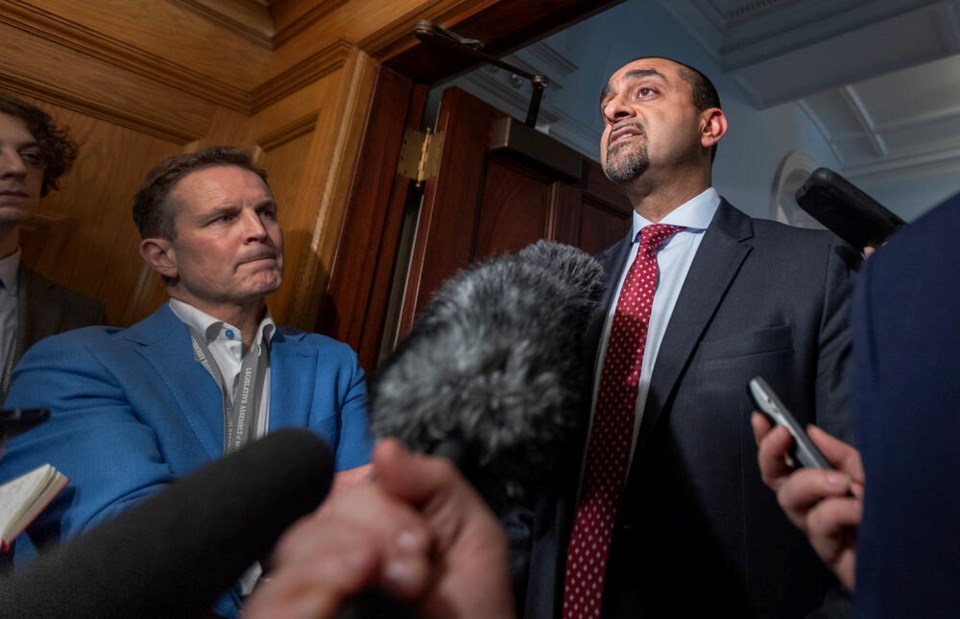B.C. officials were guarded Wednesday about the impact on Canada of the tariff wall U.S. President Donald Trump erected around the U.S., but it appears it could have been worse.
Trump’s announcement was so incoherent that much of the rest of the world had to scramble to grasp even the basic details. So cabinet ministers begged for more time to check the impacts.
“It’s still very uncertain,” said Housing Minister Ravi Kahlon, who chairs the “war room” committee responsible for countering tariff threats. “It’s hard to make sense from President Trump’s speech.”
Kahlon said the challenge is that tariff policies change hour by hour, “and anything can happen.”
But even with no direct new tariffs on Canada other than a 25 per cent charge on imported cars, which may or may not apply, B.C. is going to feel the impacts, he said.
The NDP’s main response to date has been a controversial bill that grants Premier David Eby and cabinet extraordinary powers to handle any and all economic issues for a two-year period.
The most contentious part of the bill — a section allowing him to bypass the legislature — is being withdrawn after Eby admitted he “didn’t get the balance right.”
But debate on the rest of it began shortly after Trump’s announcement.
Eby said the tariffs will be devastating on both sides of the border.
“The president is moving fast. We have a responsibility … to move just as quickly to defend B.C.”
Kahlon said the government does not want B.C. to ever be in such a vulnerable position again. The U.S. relationship is “fundamentally changed” and B.C. needs to strengthen the economy and diversify trade.
But that job got even bigger Wednesday after Standard and Poors downgraded the province’s credit rating and issued a “negative outlook” on the provincial economy.
The agency said there’s a 33 per cent chance the rating will drop again, citing “persistent and substantial deficits, compared to peers.”
Finance Minister Brenda Bailey said B.C. is still in comparatively good shape and steps are underway to cut spending.
Kahlon said the new powers in the Economic Stabilization (Tariff Response) Act will only be used if needed. “We can’t be in a situation again where we don’t have the tools to be able to respond.”
One of the tools in the bill allows a levy on Alaska-bound U.S. trucks transiting B.C. Kahlon said that doesn’t mean it is going to happen right away.
Kahlon also quarterbacked the economic response to the pandemic and said it was problematic being nimble enough to support businesses then.
He said COVID was more predictable than Trump, so the bill is needed.
Bailey said it is hard to understand the impact of Trump’s announcement.
A significant share of Canadian trade under the current continental trade agreement won’t be tariffed, but Bailey said the relationship with Trump is volatile. “Changes come with some frequency, so we remain very vigilant.”
Earlier tariffs declared on Canadian steel and aluminum are still in effect.
B.C. is also bracing for separate additional duties on softwood lumber exported to the U.S. The current levy of 14 per cent could jump to 55 per cent in coming weeks, Forests Minister Ravi Parmar said.
“It’s a bit early to say we dodged the bullet.”
Opposition Leader John Rustad said he was bracing for more than what was announced, and was a little surprised.
He said Bill 7 should be withdrawn and the government should work on lessening dependence on the U.S.
“This is a bill that’s an overreach. It doesn’t need to be there.
The latest credit downgrade, the fourth one sustained by the NDP, shows “a huge fiscal problem,” Rustad said.
“There’s no question this government has been completely fiscally irresponsible, putting our children at risk, putting this province at risk …”
B.C.’s countermeasures to date include a withdrawal of all U.S. products at government liquor stores, numerous recommendations to avoid travel to the U.S. and cancellation of EV subsidies for Tesla buyers.
Restrictions on hundreds of millions of dollars worth of procurement contracts with U.S. suppliers to the provincial public sector are being contemplated, but no moves have been made yet.
B.C. politicians will spend the rest of the federal election campaign thrashing out the details of the power grab bill, while waiting to see who gets to lead the national response after April 28.

.jpg;w=120;h=80;mode=crop)


